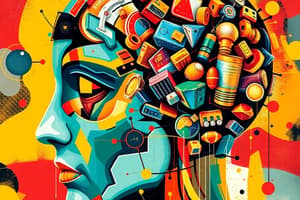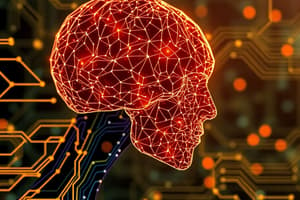Podcast
Questions and Answers
What defines Narrow AI?
What defines Narrow AI?
- Ability to learn and apply knowledge across various tasks
- Surpassing human intelligence in all areas
- Designed for a specific task with limited constraints (correct)
- Utilizing complex neural networks for deep learning
Which area is NOT commonly associated with applications of AI?
Which area is NOT commonly associated with applications of AI?
- Transportation
- Healthcare
- Finance
- Fashion Design (correct)
What is a characteristic of Superintelligent AI?
What is a characteristic of Superintelligent AI?
- It is currently operational and widely used
- It has been fully developed and implemented
- It surpasses human intelligence in creativity and problem-solving (correct)
- It focuses solely on narrow tasks
Which of the following best describes Natural Language Processing (NLP)?
Which of the following best describes Natural Language Processing (NLP)?
What is a significant ethical concern related to AI?
What is a significant ethical concern related to AI?
Which concept is a subset of Artificial Intelligence that allows machines to learn from experience?
Which concept is a subset of Artificial Intelligence that allows machines to learn from experience?
What is a common future trend in AI development?
What is a common future trend in AI development?
Which of the following technologies is primarily focused on interpreting visual information?
Which of the following technologies is primarily focused on interpreting visual information?
Study Notes
Definition of AI
- Artificial Intelligence (AI): Simulation of human intelligence processes by machines, especially computer systems.
Types of AI
-
Narrow AI:
- Designed for a specific task (e.g., virtual assistants, image recognition).
- Operates under a limited set of constraints.
-
General AI:
- Possesses the ability to understand, learn, and apply knowledge across a wide range of tasks.
- Still largely theoretical and not yet realized.
-
Superintelligent AI:
- Surpasses human intelligence in virtually all areas, including creativity and problem-solving.
- Subject of philosophical discussions and ethical considerations.
Key Concepts
-
Machine Learning (ML):
- A subset of AI that enables systems to learn and improve from experience without explicit programming.
-
Deep Learning:
- A further subset of ML using neural networks with many layers to analyze various factors of data.
-
Natural Language Processing (NLP):
- Enables machines to understand, interpret, and respond to human language in a meaningful way.
-
Computer Vision:
- Allows machines to interpret and understand visual information from the world.
Applications of AI
- Healthcare: Diagnostics, personalized medicine, and drug discovery.
- Finance: Algorithmic trading, fraud detection, and risk management.
- Transportation: Autonomous vehicles and traffic management systems.
- Customer Service: Chatbots, virtual assistants, and automated responses.
- Manufacturing: Robotics and process automation.
Ethical Considerations
- Bias: AI systems can inherit biases present in training data, leading to unfair outcomes.
- Privacy: Concerns over data collection and surveillance.
- Job Displacement: Potential for AI to replace human jobs in various sectors.
- Security: Risks of malicious use of AI, such as deepfakes and autonomous weapons.
Future Trends
- Increased integration of AI in daily life and industries.
- Advances in explainable AI to improve transparency and trust.
- Research on ethical frameworks and regulations governing AI usage.
- Continued development of AGI, with goals to enhance human capabilities rather than replace them.
Definition of AI
- Artificial Intelligence (AI) refers to the ability of machines, specifically computer systems, to imitate human intelligence processes.
Types of AI
- Narrow AI: AI designed for a single, specific task, such as virtual assistants or image recognition. It operates within strict limitations.
- General AI: Hypothetical AI possessing the capacity to understand, learn, and apply knowledge across diverse tasks. Currently, General AI is still in the theoretical realm.
- Superintelligent AI: A speculative concept of AI surpassing human intellect in all aspects, encompassing creativity and problem-solving. This idea sparks ethical and philosophical debates.
Key Concepts
- Machine Learning (ML): A subfield of AI empowering systems to learn and improve from experience without explicit programming.
- Deep Learning: A branch of machine learning that uses intricate neural networks with numerous layers to analyze data in diverse ways.
- Natural Language Processing (NLP): Enables machines to comprehend, interpret, and respond to human language in a meaningful way.
- Computer Vision: Grants machines the ability to decipher and understand visual information from the world.
Applications of AI
- Healthcare: AI finds use in medical diagnostics, personalized medicine, and drug discovery.
- Finance: AI plays a role in algorithmic trading, fraud detection, and risk management.
- Transportation: AI powers autonomous vehicles and traffic management systems.
- Customer Service: AI underpins chatbots, virtual assistants, and automated responses.
- Manufacturing: Robotics and process automation are driven by AI.
Ethical Considerations
- Bias: AI systems can inherit biases from their training data, leading to unfair outcomes.
- Privacy: Concerns arise regarding data collection and surveillance practices.
- Job Displacement: AI holds the potential to replace human jobs in various industries.
- Security: Threats of malicious use of AI, including deepfakes and autonomous weapons, warrant attention.
Future Trends
- Widespread integration of AI is projected across everyday life and industries.
- Research on explainable AI aims to enhance transparency and trust in AI systems.
- Development of ethical frameworks and regulations to guide the responsible use of AI is ongoing.
- Continuing advancements in AGI (Artificial General Intelligence) strive to augment human capabilities rather than replace them.
Studying That Suits You
Use AI to generate personalized quizzes and flashcards to suit your learning preferences.
Description
This quiz explores the fundamental concepts of Artificial Intelligence (AI), including its various types such as Narrow AI, General AI, and Superintelligent AI. It also covers key concepts like Machine Learning, Deep Learning, and Natural Language Processing, showcasing the capabilities and implications of AI technology.




